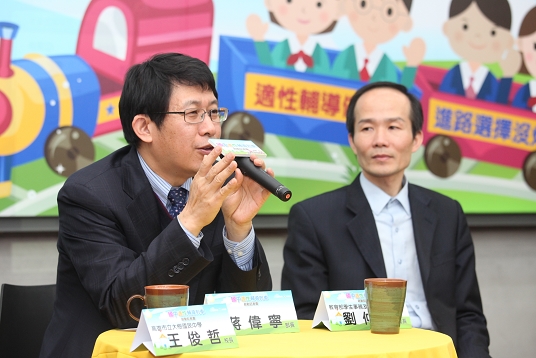Initiating the Junior High School Student Adaptive Counseling Plan to Assist Students’ Future Career Preparations and Choices

The MOE pointed out that the implementation of an adaptive counseling plan for junior high school students is a key to advise the students on a suitable career based on their aptitude, interests, and abilities, and will influence their future careers. In other words, the effectiveness of adaptive counseling exerts profound impact not only on students’ future but also on the overall achievement of the 12-Year Basic Education Policy.
Adaptive counseling for junior high school students is a long–term, systematic endeavor which needs to be implemented step by step. In order to inform society of the cultivation of adaptive counseling in schools, the MOE asked the National Academy for Educational Research (NAER) to film each junior high school’s courses, activities, and counseling sessions. After filming, NAER produced 10-12 minute films including the schools’ characteristics and practices as a reference for educators. The MOE expects that through the practical sharing of 25 junior high schools, people will understand how 7th, 8th, and 9th grade junior high school students are informed in career exploration, psychological evaluations, and job categories, as well as how they participate in student organizations.
The films will be uploaded to the “Ministry of Education Website of Students’ Adaptive Counseling” at http://career.moe.gov.tw/, the “i-Fun Learning Website” at http://stv.moe.edu.tx/, the “Promotion of 12-year Basic Education Website” at http://12basic.edu.tw/, and the websites of special (Executive-Yuan-governed) municipality and County (city) government. In addition, National Education Radio will exclusively interview the staff of 25 junior high schools and produce radio programs on adaptive counseling for more junior high school teachers and parents to download and listen to. The MOE E-paper will also have weekly featured reports providing plentiful information for readers at http://epaper.edu.tw/.
Kaohsiung Municipal Dashu Junior High School (高雄市立大樹國民中學), which was the first school to implement the Junior High School Student Adaptive Counseling Plan, was invited to the press conference to share their ideas and methods in conducting the adaptive counseling. “When the MOE begins to implement “12-year Basic Education”, junior high school students will face their first decision on career-making after completing nine years of compulsory education, such as increasing self-exploratory and decision-making abilities, connecting with the next level of education, and meeting future social needs, which are all important missions of promoting adaptive counseling at schools”, said the school principal Wang Jun-zhe (王俊哲).
The Dashu Junior High School’s (大樹國中) ideas of implementing adaptive counseling include “systematic career development education” (生涯發展教育系統化) which means that career development curricula are not only concerned with characteristics of subjects and fitting in with their contents, but also refer to the designing of school-based curricula that are responsive to the characteristics of the community where the school is situated. Secondly, the practices feature “transforming vocational education into an extra-curricular activity” (技藝教育課程社團化), which designs 9 kinds of vocational education curricula based on dividing occupations into 9 categories and combining these skills with extra-curricular activities. About 75% of 9th grade students participate. The combination of vocational education with extra-curricular activities is an effort to change the impression that vocational education is always for students who don’t like to study. Furthermore, “tailoring adaptive counseling to each student” (適性輔導工作個別化) means that the school is serious about treating each student as a unique individual, and emphasizes close cooperation between parents, teachers and students. Take an alumnus, Chen Yu-an (陳昱安), for example. He was not interested in studying at the beginning, but through the encouragement from the school and parents, Chen learned to know the variety of jobs, then realized his talent at art and design. After going to senior high school, Chen has chosen his favorite learning area and now creates marvelous works.
Adaptive counseling during junior high school is an important part of “12-year Basic Education ”. At the present stage, the MOE not only assists local governments in establishing Student Counseling Service Centers, but also recruits more and more teacher-counselors and professional counselors each year to assist. In the meantime, the MOE subsidizes special municipality and County (city) governments to implemente the adaptive counseling plan. It is expected to integrate more resources in order to optimize the effort. At the early stage of launching “12-year Basic Education”, one of the most crucial mission is to fully implement adaptive counseling at junior high schools. Later, the MOE will continuously communicate and work closely with each Education Bureau (Department) and school. And at the same time, the MOE will continue to review and improve the adaptive counseling methods to enhance its impact. We hope all junior high school students will study happily and enjoy studying while entering senior high schools, vocational high schools, or five-year junior colleges. Eventually, the students will learn and develop their potential talents, and bring their talents into full play.
